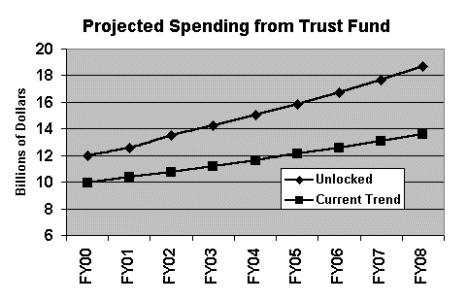Financing the Federal Aviation Administration
 | Issue Brief |
Financing the Federal Aviation Administration
July 1999
Most of the FAA’s budget is financed from the Airport & Airway Trust Fund, which receives its revenue from aviation excise taxes on airline tickets, cargo, and general aviation fuel. There is a growing surplus in the Trust Fund, yet critical aviation spending infrastructure needs go unfunded. Though the Clinton Administration has proposed charging user fees for FAA services, the solution is to "unlock" the Trust Fund by giving special budget treatment to Trust Fund spending.
Background: Unlocking the Trust Fund
 |
Federal aviation programs related to aviation, comprised of air traffic control and navigation systems, regulation and certification, and capital improvement grants to airports, are all administered by the Federal Aviation Administration and financed with annual appropriations by Congress. Traditionally, aviation excise taxes have paid for three quarters of FAA spending through the Airport & Airway Trust Fund, whose revenue is reserved for spending on aviation programs only. The remainder comes from general revenues and is used solely for air traffic control operations.
The caps on federal spending imposed by the Budget Enforcement Act of 1990 include appropriations for FAA operations, facilities and equipment, and grants to airports. These programs must compete with other spending priorities, even though the user-financed Trust Fund pays most FAA expenses.
As a result, many infrastructure improvements are unfunded, underfunded, or suffer delays in funding. The problem is not a lack of revenue. Unused revenue is quickly piling up in the Trust Fund, producing a surplus projected to reach $19 billion by fiscal year 2004. The gulf between potential and actual financing, as measured by the surplus in the Trust Fund, is caused by the difficulty of appropriating the funds under the spending cap. The chart above shows the gap between projected spending from the Trust Fund and the spending potential of an "unlocked" Trust Fund.
Last May, Congress approved the Transportation Equity Act for the 21 st Century ("TEA-21") a $216 billion highway construction authorization bill. Like aviation, federal highway spending is financed by a trust fund that relies on receipts from users through the gasoline tax. For that reason, Congress changed the budget treatment of highway spending in the bill. Since highway users are paying for a specific function, their money should be spent promptly for its intended purpose instead of competing with other functions. The taxes aviation users pay deserves similar treatment.
Rep. Bud Shuster, Chairman of the House Transportation & Infrastructure Committee, has introduced the Truth in Budgeting Act of 1999 (H.R.111) This bill would give funds allocated from the Airport & Airway Trust Fund special treatment under budget rules to allow the revenue to be spent promptly for aviation needs.
Administration Proposal for New User Fees
For the third consecutive year, the Clinton Administration called for charging user fees for FAA services in its FY2000 budget request. The Administration’s budget proposes $7.0 billion in user fees over five years, beginning with $1.5 billion in FY2000. The proposal would also gradually convert current aviation excise taxes to user fees. To collect the fees, the Administration would convert the air traffic control system into a "performance-based organization" (PBO).However, the Administration’s plan exempts most ATC employees from performance-based standards. It targets air traffic control, which is functioning well using aging equipment, but leaves untouched the FAA’s facilities and equipment development and installation units — the parts of FAA most in need of management reform. Separating air traffic control from the FAA also divides two critical safety functions that work closely together. Clearly, the PBO is a gimmick to charge user fees. Under the spending caps, charging user fees would allow more spending on non-aviation programs.
The Administration also proposes cutting the general fund contribution to aviation. The general fund, supplied by income tax and other revenue from all taxpayers, pays for 28% of FAA’s budget. Eliminating it would add to the burden on the Trust Fund and the aviation taxpayers who fund it. The White House is even targeting Airport Improvement Program (AIP) funds for a drastic 18% cut.
AOPA Position
AOPA supports "unlocking" the Airport & Air way Trust Fund, and opposes the imposition of a user fee-based financing scheme for FAA.Instead of the Administration’s user fee and PBO proposal, AOPA supports a three-part plan for meaningful financing reform of the FAA:
- Pass the Truth in Budgeting Act and allow Airport & Airway Trust Fund revenue to be spent promptly for aviation purposes.
- Preserve the general fund contribution to FAA’s budget to reflect military and government use of the air traffic control system and aviation’s importance to the economy and national security.
- Preserve the role of Congress in oversight of the FAA by maintaining the role of the Appropriations Committees as the source of FAA funding instead of allowing the FAA to charge user fees.
Current Status
Congressman Shuster introduced H.R. 111 on February 3, 1999 with the support of the Transportation & Infrastructure Committee’s ranking minority member, Rep. James Oberstar. On June 15, the House passed the "Aviation Investment and Reform Act for the 21 st Century" or AIR-21 (H.R 1000), Rep. Shuster’s FAA reauthorization bill. The text of H.R. 111 was included in AIR-21. With the support of its members nationwide, AOPA convinced the House to reject an amendment to strip the trust fund off-budget language of H.R. 111 from AIR-21. The House defeated that amendment by a 179-248 vote, and passed AIR-21 316-110. Following this success, AOPA is working diligently to pass this landmark legislation in the Senate. Secretary of Transportation Rodney Slater has said he will recommend that President Clinton veto the bill if it contains a trust fund off-budget provision.Updated Wednesday, July 14, 1999 12:39:25 PM